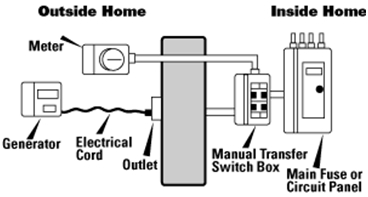Home › Electrical Engineering Forum › General Discussion › Operations of Transfer Switch
- This topic has 2 replies, 2 voices, and was last updated 9 years, 4 months ago by
Anonymous.
-
AuthorPosts
-
2013/09/13 at 11:42 am #11082
admin
KeymasterHere’s the second part of Nasir’s tutorial on Transfer Switches. If you want to send your works, articles, tutorials, debates or even share your work experience, send us a mail.
As we already know that transfer switches are used for switching of load between two distinct power sources as in the case of grid power and backup generator.
But the question is how these switches perform this task? What is their operation? The answers to these questions have been answered below.
Working principle and operation
Due to various types and diverse nature of these transfer switches there operation may vary slightly depending upon the type but overall working is same for all of them.
However a brief overview of each type is provided below.
Basic Switching
The most commonly used transfer switches are made solid state devices.
Normally phase relays are used as sensors for sensing voltage drop below a critical value defined as per user requirements.The transfer is automatically initiated as soon as a voltage drop is encountered.
A timer is usually used for counting the preset time to de-energize the main control relay and to allow for compensation time for noise that is usually generated when the generator starts.
Generator Triggering
During this time if at any point grid power is restored to its normal value the timer is reset and the generator is shut down.
On the other hand if the main supply voltage doesn’t restore to its full value the timer runs out and generates a starting pulse for the generator to start.
As soon as the generator starts another timer (Count after timer) starts its timing. This timer is to allow the voltage and frequency sensing relays to check if the parameters are within the set values for backup power.
As soon as the voltage and frequency checking is done the emergency power relay is energized which connects the backup power switch to the main utility circuitry and the backup power starts powering the complete circuit.
Re-Transference of Control
The same principle is used for re-transference of power back to the grid power. The process initiates when the grid power’s phases reach their preset values.
This state is sensed by solid state relays and again the timers and respective relays perform their duty to switch the supply to the main power.
Limiting the Voltage
A limit switch is also provided in the circuitry to allow the manual change over if needed. The switch is locked at its normal position which is pointing towards the grid power.
Lowering the switch manually shifts the power towards backup generator. This limit switch is provided only for emergency and exceptional cases and should be avoided.
Automated Switching
If you have automated setup available let it do its work unless or until it is out of order or is not performing as you desired.
Other types have similar operations like manual switch has no sensing relays and solid state devices. Rather it is a combination of relays and switches and is totally man operated.
These switches usually shift the load between small generators and main supply. However solid state switches are heavy duty and are used where large power consumption is occurring and industrial use is intended.
Normal use is 16 to 2500 amperes.
Uses of transfer switches
Transfer switch can be used in various ways.
Domestic Use
Transfer switches can be used in homes. Low power generators are used in homes or small industries. They are operated through transfer switches.
Manual transfer switch is the safest than automatic.
Use in circuit breakers
These transfer switches are used in circuit breakers to ensure the security of your appliances. The transfer switch protects both generator and utility supply.
If the connections or wiring for the generator is not verified, it can cause short circuit to the generator and eventually it can cause the electricity failure or a heavy flame.
Till now we have seen the basics of transfer switch along with their operating mode and uses. In the coming part of this tutorial, I will discuss manual transfer switches. It’s a type of transfer switches and as the name suggests it is operated manually.
Nasir.
2014/10/09 at 11:22 pm #13564Anonymous
GuestIs it possible to connect a Manual Changeover between Two Main Distribution Panels of the same Utility Supply ( both of them connected to the same Main Feeder Cable)
Thanking you in advance for your cooperation.
Regards
Muhammad Kuraan
AmbassadorE-Mail: muhammadk988@yahoo.com
2015/10/12 at 2:13 pm #13730Anonymous
Guestplease, how do i stop a generator from the ATS,after the power source-INPUT to the ATS- has being transfer from from generator to Public power.
OLASUNKANMI.
lasdejo@gmail.com -
AuthorPosts
- You must be logged in to reply to this topic.

